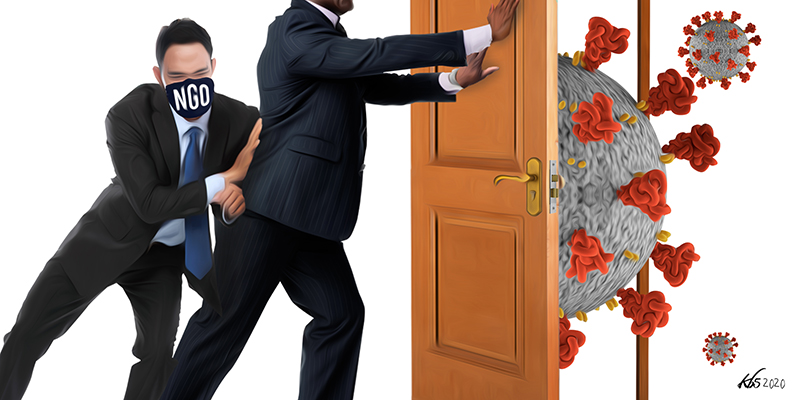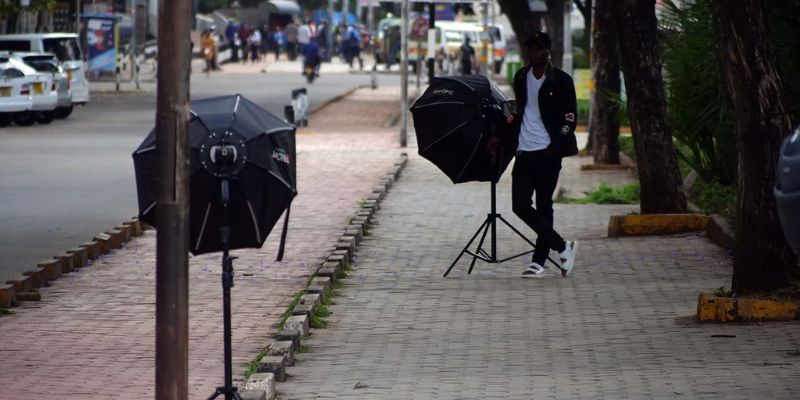Nothing has exposed neoliberalism as a hoax as intelligently and most strikingly as COVID-19 has done. (Though at the expense of millions infected and hundreds of thousands dead.) All over the world, people have come to depend almost exclusively on their national governments not only to stay safe against the deadly pandemic but also for economic survival. Against a painful history of relentless assaults on so-called “big government,” COVID-19 has grown the size of government bureaucracies and budgets in size to what was hardly imaginable only a few months ago.
This change has brought about another debate about the role of non-governmental organizations (NGOs). Nowhere is this debate about NGOs more palpable than in my home country of Tanzania, where at the time of writing the East African nation had recorded a total of 480 confirmed coronavirus cases, 18 deaths and 167 recoveries. The situation here seems to be getting out of control as more fatalities continue to be reported, exacerbated by the increasing tendency of hospitals, especially in the country’s commercial capital of Dar es Salaam, to reject patients suspected of having the coronavirus disease. Several people (see here and here) have reported having their relatives turned away by hospitals, after which some died. The government has been trying hard to underestimate the magnitude of the pandemic, including by underreporting the number of fatalities and doing night burials.
Nearly every action taken by national governments throughout the world in their efforts to contain the spread of COVID-19, and thus to save lives and communities, goes directly against the dictates of neoliberal fundamentalism. For a number of decades, advocates of this ideology would propose murderous cuts in public spending on critical sectors like health and education. In addition to the breakneck privatization of public services was the massive growth of NGOs whose missions varied widely; from those advocating for government accountability and democratic institutions to those championing girls’ rights, citizens’ agency, and countless others providing services.
This is no coincidence. The missionaries of neoliberal evangelism have been pushing for the social services provision role of governments to be replaced by NGOs and private individuals, arguing that this will ultimately improve service efficiency for governments. Perhaps there’s no stauncher proponent of that argument in Tanzania than former President Benjamin Mkapa—or at least until recently. It was under Mkapa’s administration that both privatization and NGO growth in the country took root. “Soon after assuming office, in November 1995,” said Mr Mkapa in his speech at the official launch of Tanzania National Business Council (TNBC) on April 9, 2001, quoted in “A Capitalizing City” by Dr. Chambi Chachage, “I realised the need to change the way the national economy is managed. This need was made more acute by the fact that our country was moving from a public sector led economy to a private sector driven market economy.” (Later, Mr. Mkapa would describe the privatization drive unleashed by his administration as the “worst mistake” of his presidency in his memoirs My Life, My Purpose.) In the ongoing battle against COVID-19, however, both NGOs and the private sector have been conspicuously absent on the frontlines where the war against the virus is being waged.
The role of NGOs in Tanzania has been made more interesting both by the Tanzanian government’s handling of the pandemic (which I discuss here), and NGOs’ responses (or lack thereof). So far, the responses of NGOs to the pandemic have been simply bewildering, opaque, and ambiguous. Part of this ambiguity, I think, is due to both the history of NGOs in Tanzania and the issues that they continue to remain deadly silent about. In this latter category is what seems to be an almost unanimous agreement among the NGOs, with very few exceptions, of forgoing what they claim to be their main mission, that is: to cultivate a culture of accountable governance as well as the building of strong democratic institutions in the country. This abandonment is disappointing and surprising at the same time, because during a crisis like the one we are in now, one would have expected that the NGOs, far from pretending as if they no longer exist, would double, or even triple, their efforts to force those in power to act more responsibly and deliver to their constituents.
But from the way things appear on the ground, it is as if the coronavirus disease has forced the NGOs to take some time off their work and give the government, whose handling of the pandemic has made Tanzania the laughing stock of the world, a free reign to act as it wishes. One area of concern is the way the government has entirely left people to fend for themselves amidst the crisis. In fact, instead of helping its people, the government’s asking the people to donate to it! The fact that no NGOs have so far called the government out means that the people have not just been abandoned by their government, but also by the organizations that claim to work on their behalf.
The NGOs have failed to condemn President John Magufuli’s statements and actions that threaten to put the lives of thousands at risk. These statements include the recent one he made during a televised address from his hometown of Chato, in the Geita region of northwestern Tanzania where the president has been “self-isolating” since the pandemic started. There he urged Tanzanians to consider inhaling steam from a boiling pot of water as a means to cure coronavirus, a suggestion medical doctors have nevertheless advised against. During the rare address, President Magufuli also dismissed the exercise to disinfect public spaces as “nonsense.” Earlier, President Magufuli took to Twitter to declare three days of national prayers “to help defeat coronavirus,” and his government even organized a national prayer to save Tanzania from the pandemic. All this had Matshidiso Moeti, WHO Regional Director for Africa, concerned, according to journalist Geoffrey York who reported via Twitter. In another address, where Mr. Magufuli accused Tanzania’s lab technicians of conspiring with “imperialists” to sabotage the country by increasing the number of positive cases, something which led to the sacking of the national community health laboratory director Dr. Nyambura Moremi, the President said that his government would dispatch a plane to fetch the herbal treatment for the coronavirus touted by the president of Madagascar despite a warning from the WHO that a herbal tonic cannot cure the disease. (One observer of Tanzanian politics described the address as “totally reckless” and even called on people to boycott Magufuli’s subsequent addresses on the coronavirus pandemic lest they go bonkers.) Dangerous and irresponsible as these statements and measures seem, not a single NGO that works in the area of public health—and there is no shortage of them—uttered any public criticism of Magufuli.
Nor are the democratic-championing NGOs concerned by the government’s resolve to centralize the flow of information on coronavirus. No NGO, for example, has come out against the Tanzania Communications Regulatory Authority’s (TCRA) directive to members of WhatsApp groups to screenshot “fake information” posted in these groups and report it to authorities. No NGO seems bothered by the Tanzania Police Force’s irresponsible act to storm and interrupt a press conference by the main opposition party CHADEMA intended to give Tanzanians an alternative appraisal of the coronavirus situation from that given by the government. (The party was subsequently able to organize a press conference where its national chairperson Freeman Mbowe outlined twelve issues that he thought were fundamental in the fight against the pandemic.) The same silence on the part of the NGOs was noticeable after a cabinet minister suggested that people should consider using honey when responding to a spike in the price of sugar. (Following a backlash, however, the government later announced a cap on sugar prices.)
While everybody was busy examining their role in combating the coronavirus in the country, some of Tanzania’s “top-notch” NGOs were spotted presenting the government with a 79 million Tanzanian shillings check (about US$34,000) to help fight the virus. The NGOs did that while little or nothing at all was known in the general public of the government’s strategy or even how the money will be used.
I find the move disturbingly ironic, however, given the fact that this money was originally supposed to come directly from the donors to the government coffers but the “development partners” gave them to the NGOs because, as shown above, they are thought to be best placed to deal with social problems. It is also mind-boggling to find the NGOs donating to the government amidst a funding crisis that has hit NGOs across the continent. If the NGOs themselves are convinced that the Tanzanian government can deal with the COVID-19 crisis far better than they can to the extent of giving it money, what does it say of their ideological justification to exist? To their credit, since then a coalition of Tanzania’s NGOs released a position paper and “strategic areas” on COVID-19. In the paper, the NGOs confess to have been caught “unprepared” by the pandemic, something that hampered their ability to respond “promptly.”
A close friend of mine, who works in Tanzania’s NGO sector, thought it was a bad idea for me to go ahead with this piece, saying it was unfair to criticize the NGOs given the fact that I understand the political environment within which the organizations operate and the repression unleashed on them by the state. For a moment I thought this friend of mine was right because it’s true that they work in a tough environment. But then I thought: wasn’t this very attitude on the part of the NGOs to allow themselves to be pushed around by the government responsible for their own miseries, and ultimately, their failure to do what they were founded on?
This led me to revisit 2007, when acclaimed legal and development scholar Professor Issa Shivji published a book, Silences in the NGO Discourse, which served as advice on how Tanzania’s NGOs can remain accountable. He wrote then that if the NGOs are to live up to their missions, which include ensuring democratic reforms in the country, then their entire strategy of engagement with the state would have to change radically. For example, in place of stakeholder conferences, there should be protracted public debates, wrote Shivji. Where previously the NGOs used to dialogue with the state “in five-star hotels,” now there should be demonstrations, protest marches and teach-ins in streets and community centers to expose serious abuses of power and bad policies. “Democratic governance would be an arena where power is contested, not some moral dialogue or crusade for good against evil, as the meaningless term ‘good governance’ implies … You cannot dialogue with power,” the renowned author writes poignantly.
In the wake of the ongoing debate on the role and relevance of NGOs amidst a global pandemic, and the government’s ambiguous response, it appears that more than ten years since Shivji’s book, the country’s NGOs have not been able—or willing—to learn a lesson. Nor, telling from the way they behave amidst the current crisis, is there any indication that they will do so in the near future.
This post is from a new partnership between Africa Is a Country and The Elephant. We will be publishing a series of posts from their site once a week.








